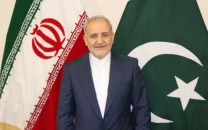Feeling the aftershocks, ISI enrollment shrinks

Feeling the aftershocks, ISI enrollment shrinks
“In 2001, the school had record enrollment. But there was a massive change post 9/11,” said Fahad Hassan, 24, who studied there from 1997 to 2003. “Pakistan became a non-family station for most foreigners,” he said. Shawal Shahid, 24, spent more than a decade at the ISI before graduating in 2003. “The experience was great back in the day when we got a lot more exposure to international culture,” he said. “It was the best educational environment [then] … It is sad to see it become a fortress now,” he said.
Misha Ahmed spent most of her childhood at the school before graduating in 2003: “With the passage of time, the population decreased, especially the proportion of foreign students,” she said. There are only 278 students currently enrolled - around one-third of these are Pakistani. The school offers an American-based curriculum to students of 23 nationalities. There was a time when each class would have around 90 students. “Now there are only 10 or 15 students,” said Mariam Saigol, a former student who graduated in 1997.
“In our times, we had separate auditorium timings for elementary, intermediate and high schools. I was shocked to see the whole school fit in that hall at one time,” she said. At the moment, there are 42 faculty members: around 55 per cent belong to North America, whereas 24 per cent are Pakistani. Over the years, more local teachers were hired. “This is because of financial reasons rather than merit,” a student told The Express Tribune on the condition of anonymity.
“The school remains closed on many days … and then there are virtual school days, when the school cannot be physically attended because of security concerns,” he said. Saigol added: “I went back to school a few years ago … needed security clearance, there were cameras all over the campus, made me feel like I had entered a central jail.” The school, along with nine others, is part of the South Asian Inter-School Association. International athletic competitions and performance arts festivals are regularly organised but Islamabad is no longer a venue. Another former student, requesting anonymity, told The Express Tribune that the tradition of extracurricular activities has waned, she said.
“There aren’t even enough students to make up some teams,” she added. Security threats make it harder for students to attend school but ISI has a solution. It is one of eighteen schools participating in the Near East South Asia (NESA) Virtual School. Rose Puffer, the school’s superintendent, takes pride in the ISI being the pilot school for this project. “Even though the political and security situation in Pakistan has been uncertain, the school has retained its position of excellence in the world of international education,” she claims on the school’s website.



















COMMENTS
Comments are moderated and generally will be posted if they are on-topic and not abusive.
For more information, please see our Comments FAQ